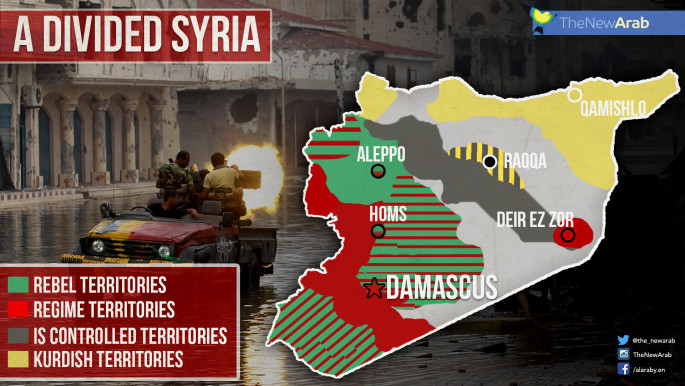Holding the fort: Iran steps up Syria support
Iran is entrenching its powerbase in Syria by stepping up its military support for President Bashar al-Assad, analysts say.
It comes as the Syrian regime prepares a major assault on rebel territories in the north, and while peace talks in Geneva look doomed to fail.
Last week, The New Arab reported that Mohsen Qitaslo from Brigade 65 was the first death in Syria from Iran's conventional military force.
The brigade is a special forces commando division, but firmly in the control of the regular army, not the paramilitary Revolutionary Guards faction.
Since Qitaslo died, at least three more troops from the army have been killed in Syria, which is said to be the Iranian army's first overseas deployment since 1979.
This would suggest that they have been deployed to hotspots such as Aleppo, where a number of fighters from Iran's Revolutionary Guard have died in the past few days.
This brings the county's death toll in Syria to 235 since October.
Battle for Aleppo
Aleppo has seen the heaviest fighting since a partial ceasefire was announced in Syria in February.
Much of the fighting has been between al-Nusra Front and some Syrian rebel factions, against the Islamic State group or regime forces.
While the rebels and Nusra have been successful in taking villages in Aleppo, government forces have also been successful in winning Palmyra city from IS.
Analysts have pointed out that most of the regime's advances have been on the back of Russian air power with Iran-backed militia groups or Hizballah ground support.
This is also believed to be the case in Aleppo, where rebels and international politicians have predicted that a regime assault is imminent.
Farah al-Zaman Shawki, The New Arab's Iran correspondent, believes that the Syrian regime has asked for Iranian support for new offensives on rebel territories in Aleppo and Idlib.
"Developments suggest that they sent special forces from the army for that reason," she said.
The fact that Iranian commandos have been sent to Syria while preparations for an Aleppo offensive are being made, would suggest the two are related.
Iran has always denied that it has committed any forces to the Syria war, other than volunteers or advisers from the Republican Guard and now regular army.
 |
| [click to enlarge] |
But many analysts believe that Iran is in fact fighting a pitched battle in Syria. Talk of "advisers" is just political cover to enable President Bashar al-Assad to retain local support.
"Iran has not sent any fighters to Syria, but only military advisors to assist the Syrian regime's forces and offer support to fight US plots," Ahmad Reza Pourdastan, commander of the Iranian army's ground forces told Iranian TV.
Fighters for hire
But many believe Iran has committed thousands to fight in Syria, particularly if Shia fighters from Pakistan and Afghanistan are included.
"Most of these advisers belong to Iran's Revolutionary Guards. There are also Shia Afghan fighters who come from Iran, they fight under the Fatimyoun brigades, and most of them live in the area of Sayada Zaynab, south of Damascus," said Shawki.
"Iran's involvement in Syria is most evident in its support for Hizballah forces in different vital and strategic areas."
They appear to have made a huge contribution to the regime, judging from images of blatantly non-Syrian fighters on the battlefield, posted on social media.
Syrian recruitment efforts meanwhile look to have failed to bring in local men, and have resorted to desperate measures such as press ganging and kidnapping youngsters off the streets.
Tehran has also helped prevent the complete collapse of the ecomomy in regime areas.
Meanwhile Iran's efforts have largely been eclipsed by Russia's major bombing campaign.
The army's deployment follows a decision by Russia to withdraw the majority of its war planes, which is said to be for financial reasons, Shawki said.
This has not stopped talk of a split between the Moscow-Damascus axis began to emerge with Russia reportedly growing tired of Assad's stubborn refusal to sue for peace.
"They [the Iranians] saw it as an opportunity to move closer to the regime," one official told The Financial Times.
However, Russia has reportedly contributed significantly to the regime's recent advances and brought in additional gunships making talk of a rift most likely overstated.
"Iran knows that Russia is a world power that has a strong voice in the international community, and Russia's stance on Syria is similar to that of Tehran," said Farah al-Zaman Shawki.





 Follow the Middle East's top stories in English at The New Arab on Google News
Follow the Middle East's top stories in English at The New Arab on Google News


